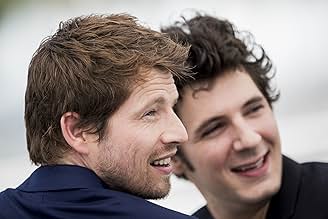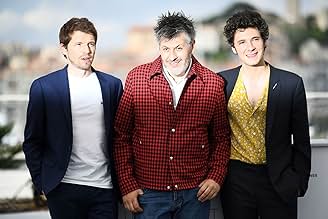PUNTUACIÓN EN IMDb
6,8/10
4,4 mil
TU PUNTUACIÓN
Un escritor Parisino y un joven estudiante de Rennes se enamoran.Un escritor Parisino y un joven estudiante de Rennes se enamoran.Un escritor Parisino y un joven estudiante de Rennes se enamoran.
- Dirección
- Guión
- Reparto principal
- Premios
- 6 premios y 11 nominaciones en total
Marlene Saldana
- L'actrice
- (as Marlène Saldana)
Reseñas destacadas
Two men fall in love with the idea of the other during the AIDS crisis and all hell breaks loose. Of course this is a storyline we've seen so many times in cinemas, but the truth is the approach in this one is very romantic and unique. The end result is sadly something I was expecting and of course not as powerful as it should have been. The main theme is not the AIDS pandemic but rather the way two people can fall in love so unexpectedly even if their lives are set in different directions. The movie drags a lot, is really slow-paced at times and the main protagonists are not always in focus thus never showcasing their chemistry. This could have been a different movie but sadly it almost feels unfinished or not fully realised.
Christophe Honore is a director who has never interested me much; Dans Paris was a bore, and most of his features haven't played in North America. He has talent, but not a narrative sense. His actors carry the movie along, but even they can't do anything about the last 30 minutes, which are a total waste of time.
Setting the story in 1993, with ACT-UP just starting in France, we are fed disjointed scenes with characters who drift in and out of the action. Pierre Deladonchamps is convincing as Jacques, and Denys Podalydes has some cynical and funny scenes. I'd really like to try Chouchen, the Breton liqueur.
Setting the story in 1993, with ACT-UP just starting in France, we are fed disjointed scenes with characters who drift in and out of the action. Pierre Deladonchamps is convincing as Jacques, and Denys Podalydes has some cynical and funny scenes. I'd really like to try Chouchen, the Breton liqueur.
The person who saw Sorry Angel with me initially mislabeled it as another gay-AIDS-relationship movie, missing the point: It ain't what you do, it's the way that you do it. Christophe Honore never lacks ideas, and--to his good fortune--he does what he pleases. He takes risks and successfully avoids cliches; Honore is one of the world's brightest, funniest, savvy auteurs...His movies are earmarked by nostalgic romanticism, but they never wallow in the past because he is able to pay tribute without imitation, a technique that evades so many of his contemporaries.
Sorry Angel is about relationships. You do not need to be gay to watch it, but you need to understand humanity and compassion. Honore gets to the meat without chewing on the fat while his poignant dialogue is relatable to everyone eventually. The context of the movie (the 90's AIDS epidemic) is a setting for the text (based on the director's university years and his gay idols, writers and directors who died from the disease) but it is the subtext, Honore's observations about relationships--discerning, unsentimental, realistic portrayals of humans both gay and straight--which elevates the movie to the forefront of cinematic reflections. Where Robin Campillo's recent BPM (another stunner) focuses on activism, Honore shows us sympathy and love during an era of uncertainty and chaos.
Jonathan Romney notes that Sorry Angel is a "novelistic film" because it presents itself like great literature. The plot might be purposefully transparent, but the devil is in the details.
Sorry Angel is about relationships. You do not need to be gay to watch it, but you need to understand humanity and compassion. Honore gets to the meat without chewing on the fat while his poignant dialogue is relatable to everyone eventually. The context of the movie (the 90's AIDS epidemic) is a setting for the text (based on the director's university years and his gay idols, writers and directors who died from the disease) but it is the subtext, Honore's observations about relationships--discerning, unsentimental, realistic portrayals of humans both gay and straight--which elevates the movie to the forefront of cinematic reflections. Where Robin Campillo's recent BPM (another stunner) focuses on activism, Honore shows us sympathy and love during an era of uncertainty and chaos.
Jonathan Romney notes that Sorry Angel is a "novelistic film" because it presents itself like great literature. The plot might be purposefully transparent, but the devil is in the details.
Fundamentally ordinary yet incredibly self-centered, the characters in Christophe Honore's "Sorry, Angel" are not easy people to like. They are mostly a group of gay and bisexual men with complicated lives who find that relationships aren't necessarily what they're good at; even having a job, earning a living or just being 'themselves' also seem to pose a problem. The two main characters are Jacques, a writer in his thirties, (Pierre Deladonchamps), and Arthur, (Vincent Lacoste), a younger student, who meet, have sex and then go about the business of falling in love but find 'happy ever after' something of a pipedream.
It's territory Honore has explored before and more explicitly but this well-crafted, if overtly cool, movie represents something of a step forward if only in terms of style. This is a more formal, less kinetic, Honore but one still unable to shake off that sense of ennui. The performances are excellent but the characters aren't engaging. Also setting it at a time when AIDS was more prevalent than it is now seems like an unnecessary plot device rather than an attempt to get us to understand or care more about the people we see. Throw in a girlfriend and Jacques' young son and you get the impression that Honore is going out of his way to be 'cool' as if making a gay epic but one without a centre. Add a load of references to cinema and literature and you know exactly who this is aimed at. One for the fans, i'm afraid.
It's territory Honore has explored before and more explicitly but this well-crafted, if overtly cool, movie represents something of a step forward if only in terms of style. This is a more formal, less kinetic, Honore but one still unable to shake off that sense of ennui. The performances are excellent but the characters aren't engaging. Also setting it at a time when AIDS was more prevalent than it is now seems like an unnecessary plot device rather than an attempt to get us to understand or care more about the people we see. Throw in a girlfriend and Jacques' young son and you get the impression that Honore is going out of his way to be 'cool' as if making a gay epic but one without a centre. Add a load of references to cinema and literature and you know exactly who this is aimed at. One for the fans, i'm afraid.
Maybe, the fundamental virtue of film is to demonstrate nothing. It is only a story about relationship, about choices, love, life, happiness and fall. Not for impress, not for be manifesto, it seems more a sort of confession to the viewer, exploration of pieces of life, delicate confesions and easy portraits of the imposibility to be the expected one by the other and invitation to discover, from other perspective, the life. No doubts, a beautiful film but, unfortunatelly, not the most convincing. But nice.
¿Sabías que...?
- CuriosidadesThe character of Jacques (Pierre Deladonchamps) shares his surname with Pier Vittorio Tondelli, an Italian author who died of AIDS.
- Citas
Pierre: Cruelty is not one man wounding another, mutilating or torturing him, severing his limbs or his head, or even making him cry. The true, terrible cruelty is that a man who cuts another off, interrupting him like dots in a sentence, or looking away from him, making him an error of the gaze, an error of judgement, an error like a letter crumpled up after starting it, after writing the date.
- ConexionesFeatures El piano (1993)
- Banda sonoraOne Love
Performed by Massive Attack
Selecciones populares
Inicia sesión para calificar y añadir a tu lista para recibir recomendaciones personalizadas
- How long is Sorry Angel?Con tecnología de Alexa
Detalles
- Fecha de lanzamiento
- País de origen
- Sitios oficiales
- Idioma
- Títulos en diferentes países
- Viure de pressa, estimar a poc a poc
- Localizaciones del rodaje
- Empresas productoras
- Ver más compañías en los créditos en IMDbPro
Taquilla
- Presupuesto
- 3.610.000 € (estimación)
- Recaudación en Estados Unidos y Canadá
- 30.628 US$
- Fin de semana de estreno en EE. UU. y Canadá
- 6559 US$
- 17 feb 2019
- Recaudación en todo el mundo
- 1.636.273 US$
- Duración2 horas 12 minutos
- Color
- Relación de aspecto
- 1.85 : 1
Contribuir a esta página
Sugerir un cambio o añadir el contenido que falta

Principal laguna de datos
By what name was Vivir deprisa, amar despacio (2018) officially released in India in English?
Responde
![Ver Bande-annonce [OV]](https://m.media-amazon.com/images/M/MV5BMGQ2ZDgwYTUtMmRhYy00ZDNkLWI1OTctZTc1YjMxM2ZkMmY2XkEyXkFqcGdeQXRodW1ibmFpbC1pbml0aWFsaXplcg@@._V1_QL75_UX500_CR0)













